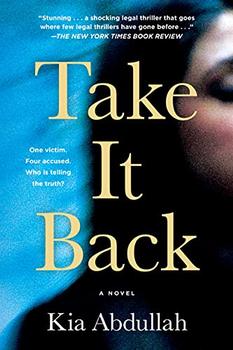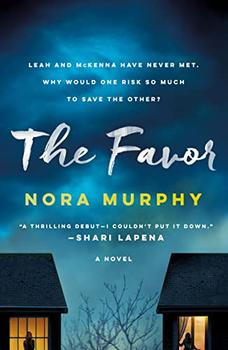Summary | Excerpt | Reviews | Beyond the book | Read-Alikes | Genres & Themes | Author Bio

From author Kia Abdullah, Take It Back is a harrowing and twisting courtroom thriller that keeps you guessing until the last page is turned.
One victim.
Four accused.
Who is telling the truth?
Zara Kaleel, one of London's brightest legal minds, shattered the expectations placed on her by her family and forged a brilliant legal career. But her decisions came at a high cost, and now, battling her own demons, she has exchanged her high profile career for a job at a sexual assault center, helping victims who need her the most. Victims like Jodie Wolfe.
When Jodie, a sixteen-year-old girl with facial deformities, accuses four boys in her class of an unthinkable crime, the community is torn apart. After all, these four teenage defendants are from hard-working immigrant families and they all have proven alibis. Even Jodie's best friend doesn't believe her.
But Zara does―and she is determined to fight for Jodie―to find the truth in the face of public outcry. And as issues of sex, race and social justice collide, the most explosive criminal trial of the year builds to a shocking conclusion.
The trial at the center of the novel is exceptionally well-written, quite captivating and the book's highlight. Abdullah skillfully shifts perspective on who is the guilty party; one minute we believe Jodie, the next, her supposed attackers. We aren't sure of the truth until the last page, and the tension the author creates keeps the narrative moving quickly. Less convincing are the sections that concern Zara's personal struggles. Given the serious subject matter, I wouldn't necessarily call Take It Back a light read, but it's definitely an engrossing one in spite of its flaws...continued
Full Review
(528 words)
This review is available to non-members for a limited time. For full access,
become a member today.
(Reviewed by Kim Kovacs).
 In Kia Abdullah's courtroom drama Take It Back, the prosecution relies on a forensic technique called DNA profiling. Also known as genetic fingerprinting, the process can be used to match bodily material found at a crime scene to a suspect, to identify a person's relatives, to determine one's risk of some genetic diseases and to identify dead bodies.
In Kia Abdullah's courtroom drama Take It Back, the prosecution relies on a forensic technique called DNA profiling. Also known as genetic fingerprinting, the process can be used to match bodily material found at a crime scene to a suspect, to identify a person's relatives, to determine one's risk of some genetic diseases and to identify dead bodies.
DNA — shorthand for deoxyribonucleic acid — is genetic material embedded in an organism's cells. It has been compared to a cookbook of recipes; it holds the instructions for making all the proteins in a being's body. 99.9% of a human's DNA is identical to every other person's, but the other 0.1% is unique. It's this tiny fraction of the genetic sequence that's used in DNA ...
This "beyond the book" feature is available to non-members for a limited time. Join today for full access.

If you liked Take It Back, try these:

by Jessica Knoll
Published 2024
From the megabestselling author of Luckiest Girl Alive comes another shocking thriller inspired by the real-life sorority and target of America's first celebrity serial killer.

by Nora Murphy
Published 2023
A gripping debut domestic suspense novel, Nora Murphy's thrilling The Favor explores with compassion and depth what can happen when women pushed to the limit take matters into their own hands.
He has only half learned the art of reading who has not added to it the more refined art of skipping and skimming
Click Here to find out who said this, as well as discovering other famous literary quotes!